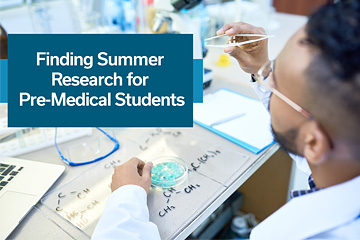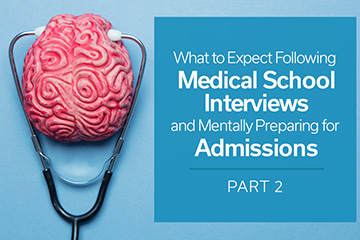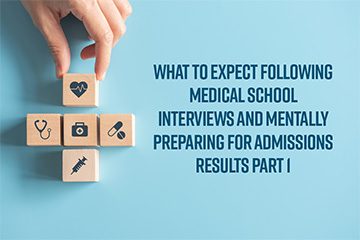
So You’re Saying I Have to Write MORE Essays? A Look into the US Medical School Secondary Application Process
Let’s throw out a few disclaimers, because this is my first blog post, and I think it’s always good to set some ground rules. My name’s Jesse. I grew up in New Jersey, did my undergraduate in Virginia, and am currently an M1 at a top 5 US medical school. I have never been involved in medical school admissions from the admissions side of things, and so I am not speaking for any of the schools I’ve attended or applied to. I am simply speaking from my experience this past application cycle, which netted me seven US medical school acceptances, including two top-five acceptances. So, for someone who really has no idea what he’s doing, I sort of know what I’m doing. These things being said, please take my advice with a grain of salt, consult multiple resources, and give me feedback so that future posts can be even more helpful!
Now that we’ve gotten that out of the way, I’m here to focus on everyone’s favorite part of the application cycle: the secondary application. Yes, the “let’s ask them generally similar, but slightly more specific questions about experiences they’ve probably already told us about so that we can charge them more money” application. Criticism of the process aside, these essays can feel like quite a drag after the arduous process of polishing a primary application for early submission in June, and can quickly consume tons of valuable summer relaxation. Though I cannot make the process that much better, I can offer some tips, tricks, and advice to help you through the secondary application stage on the path toward interview season!
What are secondary essays?
After medical schools receive your primary application, and typically after your AMCAS application is verified, though this is not always a pre-requisite, medical schools will send you additional forms to fill out. If you submit your primary in early June, when it opens for submission, you’ll begin receiving secondaries in the first or second week of July. The forms typically include some additional demographic information questions, some additional essays, and occasionally, they ask for a JPEG photo of you (don’t stress, but keep it business casual at the very least). Most schools today don’t pre-screen applicants, but send the secondary application to all students who apply, hence my above frustration with the way the process extracts money from applicants. The essays are, of course, the daunting aspect, but the below tips should make the process a bit less stressful!
You can preview (and even pre-write) secondary application essays for most schools.
Follow this link to find a comprehensive list of past secondary application essays for most US medical schools: https://www.prospectivedoctor.com/medical-school-secondary-essay-prompts-database/ . I will be honest and say my ambitions for pre-writing these essays far out-paced my actual ability to pre-write them, so don’t stress if they start rolling in and you haven’t written any secondaries. However, I would highly recommend taking a look at the secondary essays from years past. Though schools do not always ask the exact same questions, they do often ask the exact same, or similar questions. Even if they decide to totally change the essays up, it’s likely that any essay you write or think about will show up in another schools’ secondary.
The dreaded timeline.
There is a solid faction of the online pre-med community that is somehow convinced that not sending secondary essays back immediately equates to rejection. This is definitely not the case. Though it’d be great to send the essays back within 3 or 4 days of receiving them, I’d have to say that a timeline of two weeks is plenty fast, much more realistic, and relatively do-able. I sent some secondaries back in less than a day and was met with silence, and waited over two weeks for others and was met with quick interview invitations. There is far less rhyme or reason in this process than people claim there is, so focus on writing strong essays and on returning them as quickly as you can, but don’t stress about the specifics. My one caveat to this suggestion is to read through the secondary application thoroughly. A few schools do request them back on a very specific timeline, though I was never asked for essays more quickly than two weeks from the date I received them.
But what about the content?
I’m going to answer this question as specifically and also as generally as possible. Specifically, I applied straight-through from undergrad, and I submitted my primary application on the June 1st opening day. I wrote about nearly everything I had done or accomplished in undergrad as a part of that primary and was super worried about what I would include in my secondary essays that would be different or help clarify who I was. In my case, I was fortunate enough to be participating in an internship that was quite different from anything else I’d done, which gave me another specific, significant experience to talk about when the secondary applications rolled through. Of course, this was just my experience, but I would highly recommend browsing the secondary topics and either saving some of the cool stuff you’ve done or, if you’re about to embark on a cool gap year experience, making sure you’re ready to talk about that in the secondary application. This is a small piece of strategy that was never shared with me, but it definitely worked in my favor, and I think it could work in yours! That being said, the primary application is still the main application, so I would never recommend intentionally weakening your primary just to save a small experience for your secondary. If you have more specific questions about this, feel free to contact us! As for general content tips, it seems as though admissions committees really just want to know who you are. Write about experiences that have impacted you, regardless of whether or not you think they fit the pre-med “mold.” I wrote about a summer I spent landscaping, my experiences growing up at summer camp, and my love of guitar hero, just to name a few of the true left fielders, but these physicians and students care so much more about discovering who you are than about hearing exactly what they want to hear.
Again, I want to reiterate that these tips were meant to be general, and encourage all with specific questions to schedule an appointment with one of our Consultants, who are more than equipped to help you in a successful US medical school application cycle! Most importantly, remember that though the secondaries are just one piece of a big puzzle, they are the first school-specific part of the application, so try to save some steam for that last push before the interviews! And please, unless you’re actually passionate about guitar hero, don’t write a secondary about that!






